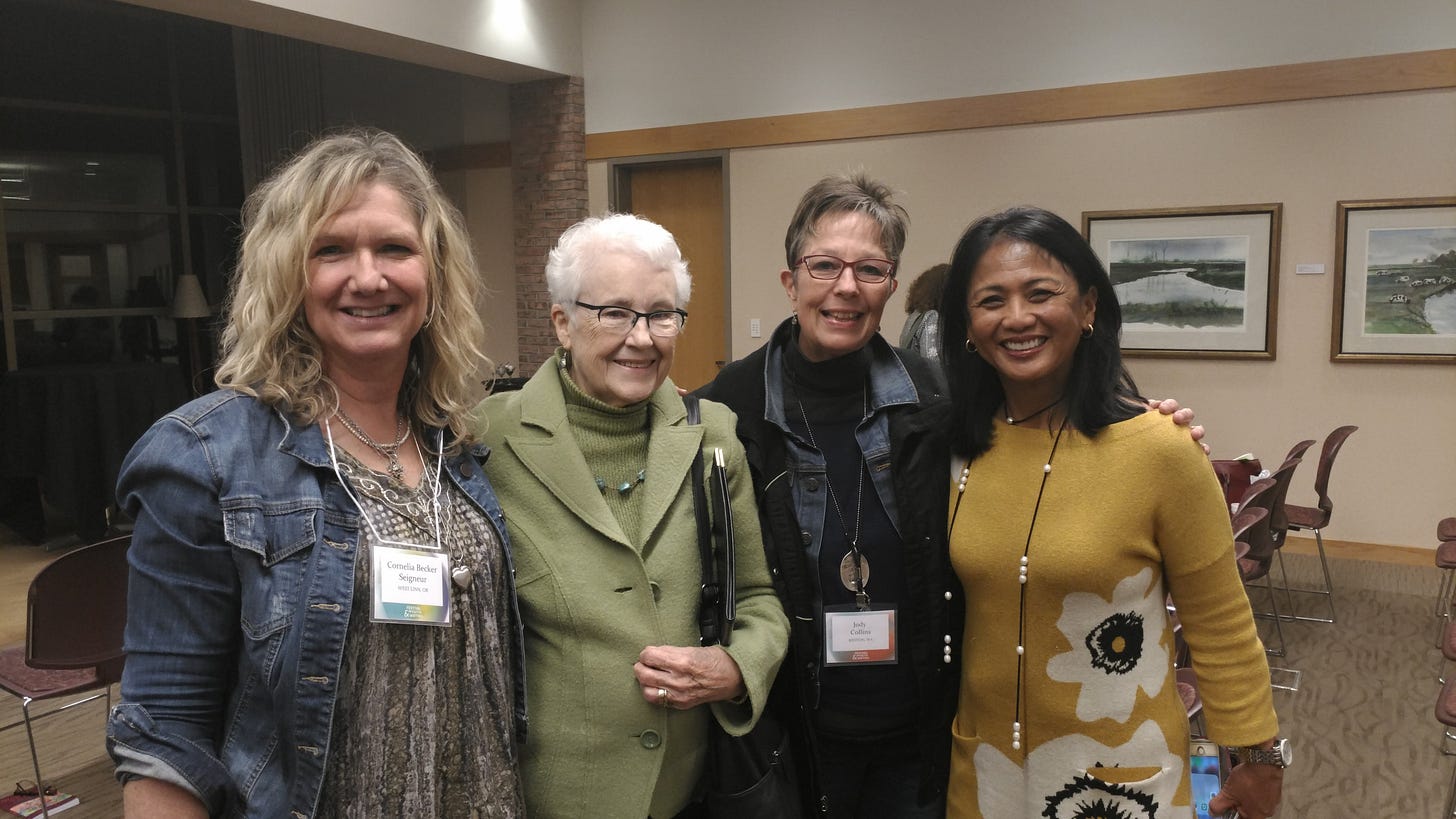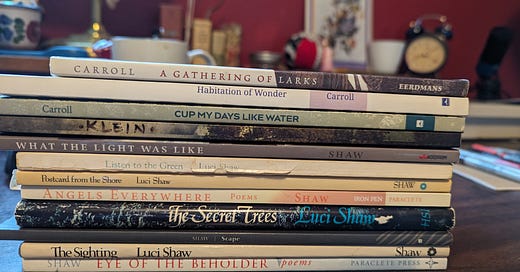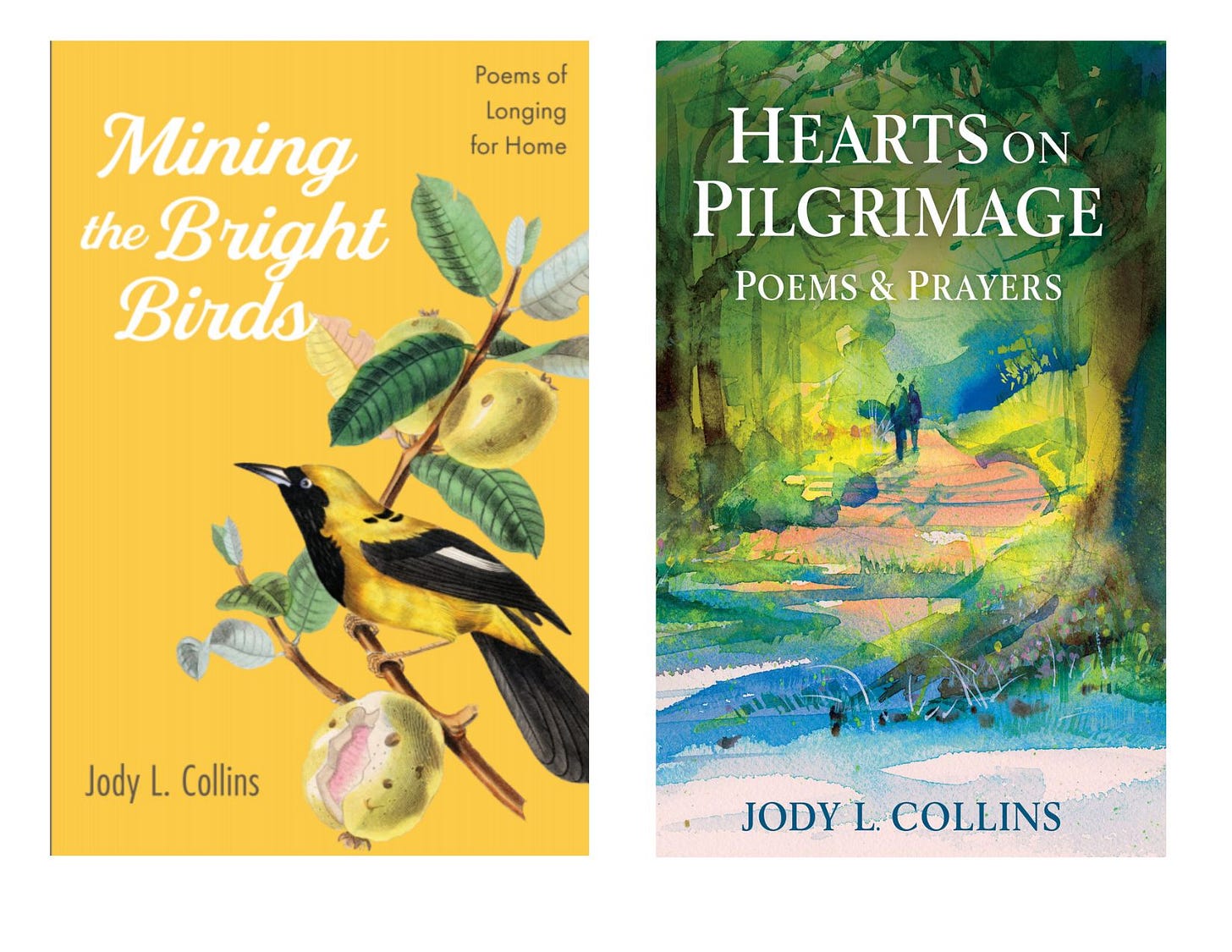My Grandkids Asked Me
Complaints are afoot in certain close quarters
that my poems don’t rhyme, they’re merely imposters.
The grandchildren ask me, “Is that how you write one?
I’m not really sure, Nana, your kind’s the right one.”
“There’re no matching endings, really no reasoning.
It’s like eating roast beef without any seasoning.
Tasteless and boring, and lacking all color,
we honestly think that there’s nothing duller.”
Well fine, I give up, I’ll leave free verse behind,
and because I’m your Nana, exceptionally kind,
I’ve put pencil to paper, all right, I can show ‘em
Read on my dear lovelies, for here is your poem.”
fr. Mining the Bright Birds: Poems of Longing for Home, 2023, Wipf & Stock/Resource
How it Began
The first poems I ever saved are from Mrs. Appy’s Ninth grade English class in a folder labeled simply ‘Poetry.’ 50 years later I can’t for the life of me locate it but I can see its contents--the ditto ink is faded but still quite legible. There are selections by Richard Brautigan and e.e.cummings, of course, and a poem by Robert Frost. Also something about John F. Kennedy’s assasination. Sigh.
I think about Mrs Appy often and wonder if she knew our future selves would want these poems for posterity. I’m sure I was much more focused on how I’d be working on my tan at the beach come the weekend. Southern California was a hard place to be in school during the lovely months of late May.
I have kept a lot of poems and pieces of paper and letters and what-have-you over the years. Newspaper clippings, magazine articles, concert tickets—James Taylor, 1971—all have pride of place in the flotsam and jetsam of my files.
Keeping what we love can be a way to share a legacy with those who come after us; they tell a story of our lives, revealing what’s important to us, what makes us tick. I have found that the things we keep also keep us.
The love of words and language has always drawn me in, long before 9th grade. I have vivid recollections of my 12-year-old self hiding in my bedroom with a book, away from the noise and chaos of a busy houseful of siblings. Our home was a fractured place at best; absent, inattentive parents and an overworked mother made life tenuous at times. Little Women, Freckles, Rose in Bloom…these are some of the classic stories that filled my heart with presence and beauty and peace I craved. At least in books there were people who cared for and loved each other.
Reading and writing are often intertwined; all those stories led to inventing some of my own. My make believe dreams began to take shape first in the loopy pencilled pages of elementary school newsprint. Pencils gave way to typewriters where I fumbled madly on the Smith-Corona typewriters in middle school and high school typing class. I graduated to a computer keyboard many years later as a young mother, pocketing away time at my husband’s desk.
While raising our two children I did very little writing or reading, but did manage to stumble upon the work of Luci Shaw—a Christian! A poet! Who knew? (I still have my copy of her first book, Listen to the Green, 1973, which she graciously signed for me 45 years later.) The seeds of poetry were planted.
I continued to manage stealing away to write amidst parenting, typing out my rambling thoughts, particularly about education. I had thoughts.
I eventually had several Letters to the Editor and essays published in our local paper—the Fresno Bee—one of which I was actually paid $75 for. Even Instructor and People magazine printed some of my musings. Of course, being featured in a Letters to the Editor column didn’t pay, but it was something just to see my name in print.
After my children were on their elementary school way, writing fell by the wayside and my words languished when I went back to school as a “re entry student” to pursue a teaching degree. There was simply no time for creative pursuits. After graduation and with my newly minted teaching credential I jumped into teaching and then blinked. Twenty plus years had gone by and the writing bug was still there. Our children were grown and in college when someone mentioned blogging as way of ‘getting published.’ I thought I’d give it a try; the year was 2012.
Did I mention I blinked?
Behold, the Website
Our family had relocated from California and had been in Seattle over 20 years by then and found ourselves in January of that year completely snowed in. For a week. My kids weren’t driving to school, and I certainly wasn’t slogging to my classroom anytime soon.
So, I Googled “What’s a blog?” As one does. One week later I had a website, Three Way Light.1 Thank you, Blogger.
I also discovered an online community of Christian writers called ‘The High Calling,’ overseen by then-editor L.L.Barkat. The internet provided virtual parchment and I dove into writing and never looked back.
I did not write poetry.
My focus? “The intersection of faith and life” a broad-brush stroke of amorphous intent if there ever was one. The essays and reflections on my author site ranged in content and random reflections as I waxed eloquent on any and everything through the lens of life as a Christian. I had thoughts, especially about teaching and parenting. (See Letters to the Editor above.)
However, after a decade of writing online, as well as being featured in various print publications, I began to reassess my center of attention. When one is, ahem, a certain age, one’s legacy to those who come behind looms large. If I was going to devote my time to writing, what really mattered most? Where was I going to invest my finite amounts of time? It took time to decide.
Inspiration Abounds
I had been following L.L. Barkat’s work and role online as she interfaced with writers as cheerleader and encourager; her influence in my life cannot be understated. She posited an idea of the presence of a “Divine Librarian” in one’s life Who guides as we pull books off the various shelves we encounter, a theory that resonated deeply with me. I could track my growth spiritually, mentally and emotionally by the choices of books I “just-so-happened” to read through the years. Her theory holds.
L.L. pivoted in 2013 and committed exclusively to poetry, founding Tweetspeak Poetry2, an online community and publishing company which has continued to flourish and grow. My own flourishing as a poet and owning that title can be traced to L.L.’s influence, encouragement and inspiration.
Her nudges had me pondering my path towards poetry. If my time on earth was distilling itself, what if I distilled my writing as well? What would happen if I learned to say more with less, became focused on the sound of language and images? Who knew?
Poetry it was.
I began by reading the work of other contemporary Christian poets: Tania Runyan, Luci Shaw, Malcolm Guite, and others3, then buying their books, going to workshops and attending panels and readings. Each one of these writers was beyond gracious and encouraging, putting up with my newbie naiveté and questions. I was hooked.
I went all in on poetry in early 2018, reading, reading, reading. Well, and fangirling. The circle was complete when I was able to meet Luci Shaw4 in person to tell her what a difference her words had made early in my life. She sat for awhile and listened with great interest, something I will always treasure.

I continued to practice writing poetry, doing it badly of course, then with the help of teachers and editors eventually was privileged to find two “slender volumes of modern poetry” out in the world5. (Malcolm Guite’s phrase). (2021 and 2023).
I also moved my weekly writing from my website blog here to Substack in late 2023—and what a joy it has been! The connection and engagement have been good for my soul.
My grandkids still aren’t sure about the legacy I’ve left them.
“Your books are pretty, Nana, but your poems don’t rhyme.”
The five oldest grandkids range in age from 13-22. The youngest one is 5 ½ and has no opinion.
“What’s a poem?”
No matter. I pray that one or two of them will take a book of mine off their own shelves someday, leaf to a page and find the words shimmering, then share them with a friend.
“My Nana wrote this. May I read it to you?”
I pray that is so.
What my Grandkids Will Say About Me on Oprah
When my grandkids talk to Oprah about their Nana, the famous writer,
they will say words were my oxygen— to read, write and share
and that I spent way too much money at thrift stores on books
by dead authors—Emily Dickinson, George Herbert, L. M.
Montgomery and Keats.
They will also tell her I loved to sing— another form of breathing—
and how I embarrassed them in public by belting out the “Tomorrow”
song from Annie or grabbing their elbows in the mall while shouting,
“We’re off to see the Wizard!”
They will announce to the world, in front of God and everybody,
that my profession as a teacher was their greatest undoing; constantly
coachingabout penmanship, the correct formation of the letter “a,”
pointing out misread syllables in a favorite text.
They will oblige Ms. O’s prodding by adding the death knell—that I
couldn’t help myself when it came to learning, revealing in hushed
tones that I often resorted to using an encyclopedia as torture
(the 1956 World Book edition).
My grandchildren will remind her, however, (before the commercial break)
my best qualities were the way I delighted in the world, showing them wonders
in the garden, surprises in the grass, the avian miracles of chickadees and juncos
in the branches, robins in the birdbath.
Most of all, when my grandkids talk to Oprah, they will tell her my lungs longed
for the breath of Heaven, the Word, and how its oxygen proved my greatest life
support throughout my livelong days.
-From “Mining the Bright Birds-Poems of Longing for Home”, Wipf&Stock, 2023
Friends, tell me in the Comments what you’ve saved for posterity, those treasures that whisper to the world What Matters Most. I’d be honored to hear.
-Jody
P.S. This essay is an edited version of a guest post originally published on Matthew Long’s Substack ‘Beyond the Bookshelf,’ April 15, 2025.
Three Way Light morped into my current author website jodyleecollins.com
Three Reasons to Read Poetry and a FREE list of 25 Christian Poets can be found here








I enjoyed reading your journey. I wrote a poem about soap in 5th grade and the teacher showed it to the other teachers after school. Silly me, I thought I had done something wrong. No one said they were reading it because they liked it!
Jody, loved reading the backstory of how poetry entered into your life and blossomed. My grandchildren also roll their eyes when I try to advance their skills in grammar. In fact, my oldest granddaughter gave me a mug for Christmas a few years ago that says, "I am silently correcting your grammar!" (I'm guessing it was her mother--our daughter--who made that happen!)